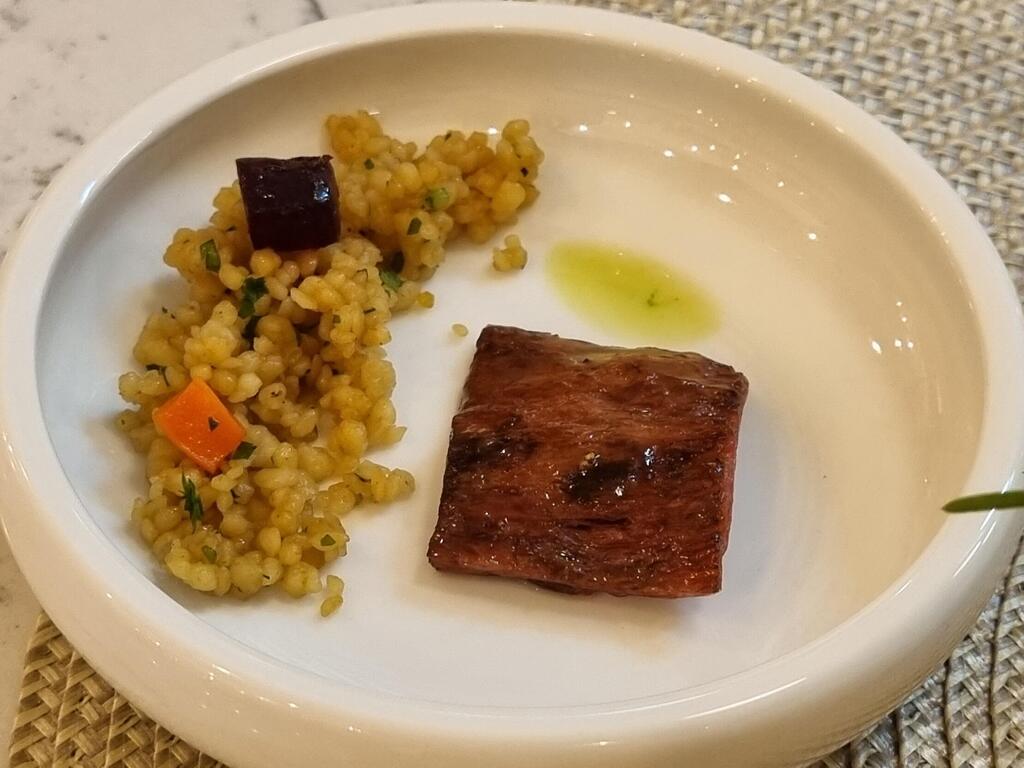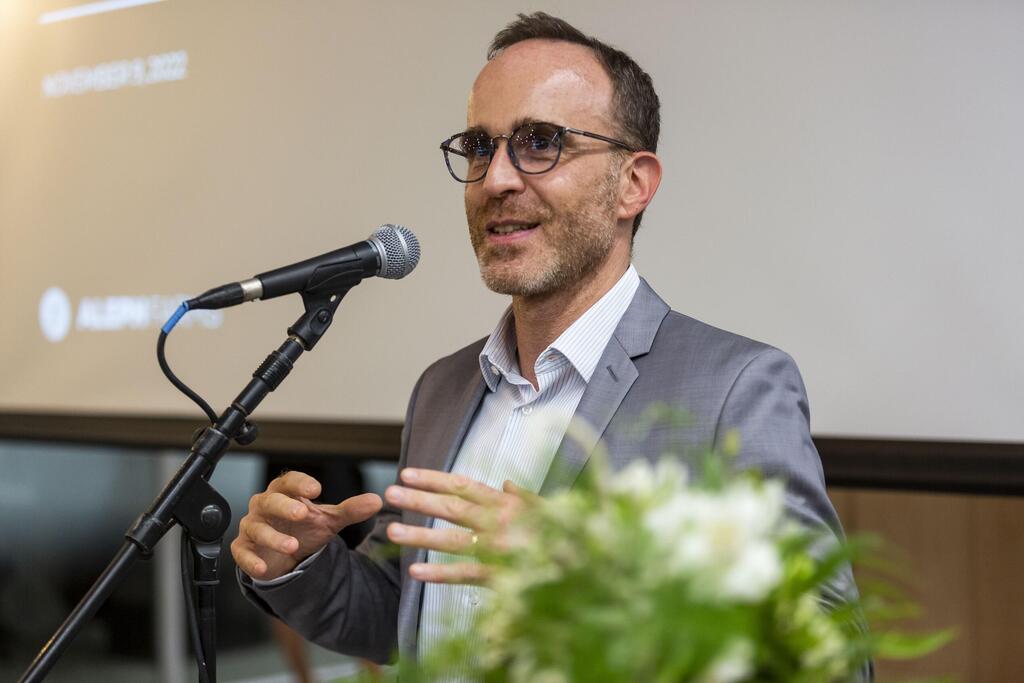Israel is on its way to becoming the first country where you can eat cultured beef. the Israeli food-tech company Aleph Farms announced on Wednesday that it received the first regulatory approval from the Health Ministry, which will pave the way for marketing cultured beef in Israel. It is estimated that the company's first steak will reach restaurants later this year.
Read more:
Unlike plant-based meat substitutes, such as those of Beyond Meat or Redefine Meat, cultured meat is based on cells taken from a cow or other animals and grown in bioreactors. Scientists presented a cultured hamburger back in 2013 at a press conference in London, but it was only a demonstration of what's to come. Only in recent years has cultured meat begun to leave the laboratory and reach consumers.
Singapore was the first country to approve the marketing of cultured chicken in 2020, and since then the U.S. has joined it when it approved companies like Upside Foods and Good Meat to distribute their cultured chicken products. Now Israel has become the first country to grant regulatory approval for cultured beef.
According to the announcement published by Aleph Farms, the Health Ministry issued it a regulatory approval known as the "No Questions Letter", which means that its product is safe for consumption. At the end of a bureaucratic procedure that is expected to last a few more months, the company will be able to start selling its product in Israel.
Aleph Farms intends to serve its first cut called "Culturized Petite Steak" in Israeli restaurants. This is a thin piece of steak which, according to the company, is made from cells of a fine black Angus cow named Lucy, which has not undergone any genetic modification or preservation process, as well as from a vegetable protein scaffold made from soy and wheat.
"Apart from cells derived from one of Lucy's fertilized eggs, there are no animal-derived components in the production process or in the final product," the company says. "No antibiotics were used in the production process either."
Didier Toubia, CEO and co-founder of Aleph Farms thanked the Health Ministry and linked the recent approval to the war in Gaza: "We believe that addressing common challenges such as food security will be the best way to ensure the prosperity of the Middle East region, as well as other regions around the world which are significantly dependent on food imports, with an emphasis on Asia." Yifat Gavriel, head of the regulation, quality assurance and product safety department at Aleph Farms, said that the company's regulatory team is working simultaneously with authorities around the world to obtain regulatory approval in additional markets.
The ministry stated that "cultured meat is defined as 'new food' and therefore this requires a complex and detailed approval process, similar to what is done in the world, in order to protect public health. In this framework, each new food is examined on its own merits, since each company has its own technology, production processes and different product".
Dr. Ziva Hamama, Head of the Food Risk Management Department in the Health Ministry, added that "the approval comes after a variety of critical factors have been examined, including toxicology, allergens, nutritional composition, microbiological and chemical safety of the new food and its production process in all its aspects. Starting with the initial cell isolation and including the processing and packaging of the finished food product."
Ella Waldman-Rentzer, Vice President of Strategy and Governance at the GFI Israel organization that promotes the alternative protein sector, said that the regulatory approval received by Aleph Farms is "a turning point for the Israeli and global food system. We congratulate the members of Aleph Farms for receiving the approval and the Prime Minister's Office, the Ministry of Health, the Israel Innovation Authority and the National Food Services for their professional work. This achievement highlights the government's continued support and belief in the field of Israeli alternative protein, which is one of the most prominent in the world."
Such a product that brings a positive effect on both air pollution and the treatment of animals is considered international news due to its effect on the climate
Ronit Eshel, director of the food-tech department at the Israel Innovation Authority, praised Aleph Farms and said "the State of Israel has become a world leader in technological developments in the field of food-tech thanks to such companies, who dreamed, were not afraid to develop groundbreaking products at an international level. Such a product that brings a positive effect on both air pollution and the treatment of animals is considered international news due to its effect on the climate. This is a historic day and we are proud to be part of the success."
Supported by Leonardo DiCaprio
Alpeh Farms was founded in 2017 by Didier Toubia, Dr. Neta Lavon, Prof. Shulamit Levenberg from the Technion University, Strauss' The Kitchen think tank and the Israel Innovation Authority. The company introduced the world's first cultured beef steak in 2018, and the world's first cultured entrecote steak in 2021. Since it was established, the company has raised about 140 million dollars, with the notary funders being international food giant Cargill and Leonardo DiCaprio, who serves on the company's advisory committee.
The food-tech industry offers cultured meat as a solution to the enormous harm the traditional meat industry inflicts on the animals and the environment. However, the producers in the field face two significant challenges: the scale of production, which needs to be on a satisfactory scale to be a real alternative to animal-based meat, and the pricing, which needs to be attractive enough to make consumers choose the alternative.
Aleph Farms has not yet announced what the price of its product will be, but in an interview from 2022, CEO Toubia said: "We intend to start with a premium of 50%-100% and break even In five years. We are in a much better position compared to the new generation of herbal products, which were 300% more expensive when they hit the market and after ten years they are still more expensive." In the same interview, Toubia estimated that Aleph Farms products will reach stores in 2025 or 2026.
A local food-tech powerhouse
Aleph Farms is not the only Israeli company that develops cultured meat: Believer Meats, Steakholder Foods, SuperMeat and MeatAfora also operate in Israel. There are also several companies operating in Israel that develop cultured fish and seafood, including Wanda Fish, Sea-2-Cell, Forsea and Mermade Seafoods and EFISHient Protein. Some of these companies are still in the early stages of research and development, and none of them have yet received regulatory approval.
5 View gallery


The EFISHient Protein fish prototype has yet to receive approval
(Photo: Roy Shpernik)
Israel is at the forefront of the global food-tech industry. According to GFI Israel, a research institute that works to promote the alternative protein field, $454 million were invested in Israeli companies in the field which make up 15 percent of global investments in 2022. The Israeli industry was second only to the U.S., which raised approximately $1.246 billion. Investments in Israeli companies in the field crossed the billion-dollar mark in 2021-2022.
According to Waldman-Rentzer, "the strong presence of Israeli companies in the field of cultured meat, fermentation and plant sources, alongside the activity in academia, entrepreneurship, industry and consumption, create the opportunity to lead the field years into the future in Israel. Thus strengthening our ability to give value to the countries of the world in an era of climate crises and food security".






